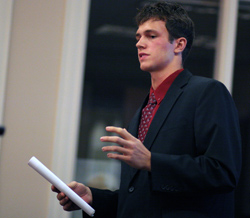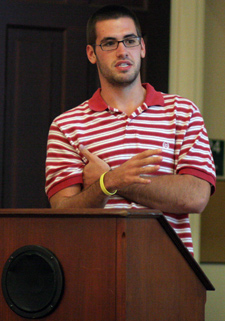Poverty’s impact, the hardship of practicing medicine, and learning and working in another language are just a few of the lessons Wabash men learned during the summer of 2007 in Ecuador.
Wabash’s Ecuadorian Studies Program took 11 Wabash men to the South American country in 2007. The students made presentations Sept. 20 on their impressions and individual research. The students also posted to a blog while in South America.
 "I gained a new respect and desire to learn," Tyler Dougherty ’09 said. "After seeing the conditions in Ecuador, I’ve learned better than ever that I have such great professors, facilities, and need to make sure that I don’t take them for granted."
"I gained a new respect and desire to learn," Tyler Dougherty ’09 said. "After seeing the conditions in Ecuador, I’ve learned better than ever that I have such great professors, facilities, and need to make sure that I don’t take them for granted."
Dougherty and Brian Maloney ’09 studied Ecuador’s agriculture, which focuses primarily on bananas. Their presentation compared that country’s production to the much-more modern ways of U.S. producers.
Dougherty, who owns and runs an Apple Orchard in northern Indiana, found the stark comparisons interesting. But the impact of the country’s poverty went even deeper. "You never really understand poverty until you see it first hand."
The program has been a staple in the College’s on-going immersion learning experiences. The yearly trip to Ecuador has allowed the program to mature, said Co-Director Dan Rogers.
"We now have enough contacts in Ecuador that students can do almost anything they want to do," the Spanish professor said. "Most study abroad programs are about language and then culture. Ours is certainly about language and culture, but it can also include almost anything else that students and faculty are interested in – from agriculture to medicine, Amazon ecology to the politics of the petroleum industry, from religion to popular culture."
Rogers said pervious years’ experience has helped him better prepare students to maximize the four-week visit. He created a ½-credit orientation course students take in the spring before the summer trip.
 Andy Leshovsky ’09 a pre-med student, was prepared for the trip but nothing could have prepared him adequately for his work in a jungle clinic. "I was immersed in the learning of all the workings of tropical medicine, but as that initial shock wore off and I became more accustomed to the environment, I found myself really wanting to make a difference in the lives of the so many unfortunate people living in the middle of the Amazon."
Andy Leshovsky ’09 a pre-med student, was prepared for the trip but nothing could have prepared him adequately for his work in a jungle clinic. "I was immersed in the learning of all the workings of tropical medicine, but as that initial shock wore off and I became more accustomed to the environment, I found myself really wanting to make a difference in the lives of the so many unfortunate people living in the middle of the Amazon."
That’s exactly the type of impact Wabash professors hope the Ecuadorian program makes on students.
"It gets students out of this isolated environment where they see the rest of the world only on television," Economics Professor Kay Widdows said. Widdows let one study group this year, her third. "It stretches them by putting them in a less comfortable environment.
"They are forced to experience new things – new food (guinea pig), new methods of transport. They become more confident in their abilities to get around in the world. All of the students I’ve taken to Ecuador want to go back."
Leshovsky would be quick to agree with Widdows’ assessment. "Not only did I receive critical insight into health care in third world countries and make a noticeable difference in the lives of a few Ecuadorians, but I also was able to take home with me an unforgettable, rewarding experience I hope to be able to repeat in the future."
Ben Ladowski ’09 was part of Widdows and Political Science Professor Melissa Butler’s group. He showed short films detailing a street festival. John Funston ’09, who transferred from Purdue’s tourism school to Wabash, focused on eco-tourism in Ecuador.
 The presentations give just a glimpse of what the experience is like. Andrew Chelton ’09 made a video of the trip and loaded it onto the popular You Tube site. He showed the video during the presentations. You can see it here.
The presentations give just a glimpse of what the experience is like. Andrew Chelton ’09 made a video of the trip and loaded it onto the popular You Tube site. He showed the video during the presentations. You can see it here.
Chelton studied education in Ecuador and came away with a new appreciation for his own education. "I was able to get a feel of what it was like to live in Ecuador in both the city and in the jungle," he said. "Seeing all the problems that Ecuador faces and how incoherent their government can be, I remembered that I should never take my own way of life for granted."
Rogers believes the immersion experience is invaluable to the many students who have now participated. "You could spend a semester reading about (poverty and unemployment), but nothing can take the place of meeting and talking to kids who survive on the street," he said. "It’s one thing to quote percentages that demonstrate the huge divide between the haves and have nots.
"It is quite another to watch a late model Porsche drive past a desperately impoverished indigenous family selling produce on street corners. Teaching and learning that includes only the theoretical, only the dispassionate and factual doesn’t change lives. It’s when we link that with the affective that people change habits, behaviors, and points of view."
And those visits create bonds which change people and create stronger bonds between faculty and staff.
"It breaks down the barriers between professors and students," Widdows said. "There is no greater leveler than everyone falling down in the mud. We all find ways to help each other out. Also a great bonding experience for the students as they share experiences that will be life-long memories – like jumping three stories off a waterfall and crossing a raging torrent on a makeshift bridge our guide made by chopping down a small palm tree with a machete."